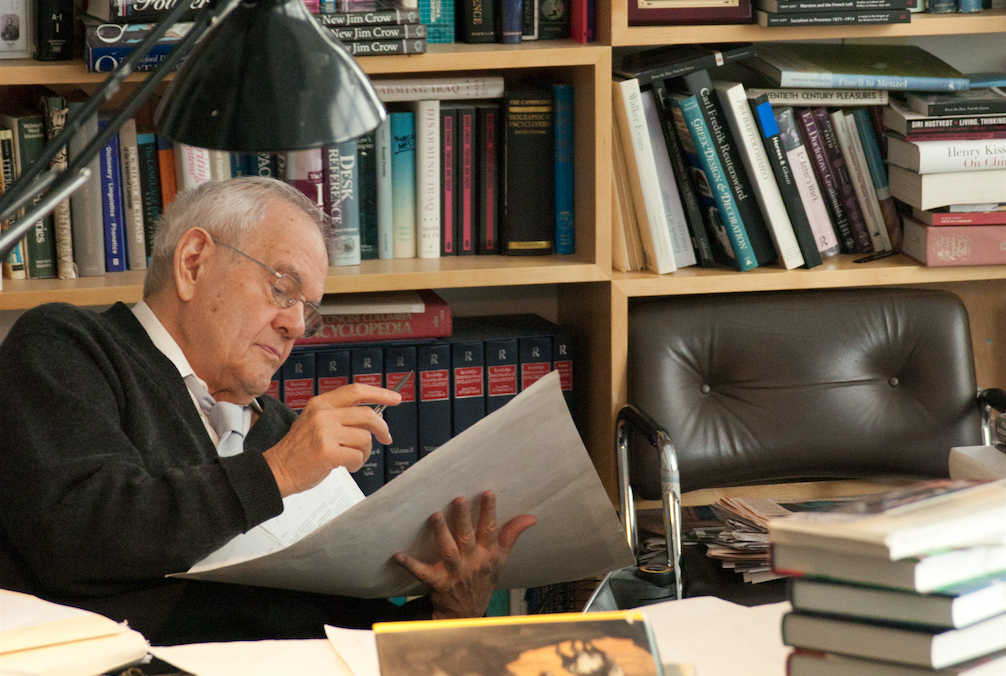
Bankrupt
Wespennest 189 (2025)
Bankruptcy in nineteenth-century parables of capitalism; billionaires, bankruptcy and the American obsession with money; and why the refusal to accept the end makes life worse.
The late Robert Silvers, co-founder and editor of the ‘New York Review of Books’, was aptly characterized as ‘the author who doesn’t write’. A tribute to a one of the most important actors in the global intellectual public sphere from two of Eurozine’s co-founders.
Last week, the Republic of Letters lost one of its most distinguished citizens. On Monday 20 March, Robert Silvers, co-founder and editor of the New York Review of Books, died at his home in Manhattan. He was 87.
Timothy Garton Ash once remarked that if he wants to reach ‘the widest European intellectual audience, the best way is to write an essay in the New York Review of Books’. Published in the US, ‘the paper’, as Silvers used to call the Review, was indeed part of a borderless community of ideas and values. At times it has felt as if it by itself constituted that elusive public sphere Europeans miss so dearly.
On the masthead of the magazine, ‘The New York Review’ is much bigger letters than ‘of Books’, signalling very clearly the ambitions of the editorial heart and mind behind it: this is much more than a book review, it’s about an idea of the world. Or ideas, in plural. Tom Wolfe once mocked the New York Review of Books as ‘the chief theoretical organ of Radical Chic’, and Saul Bellow rechristened it the New York Review of Each Others’ Books. Yet Silvers’ own description of how he and Barbara Epstein founded the magazine in 1963 better captures the gist of this endeavour. In The 50 Year Argument, Martin Scorsese’s film on the occasion of the Review’s fiftieth anniversary, he says:
‘We both shared some kind of quest, a quest for great writing and brilliant writing. When Barbara and I started the Review, we were not seeking to be part of an establishment. Quite the opposite. We were seeking to examine the workings and the truthfulness of establishments, whether political or cultural.’

Image: Annie Schlechter
The controversies in the New York Review of Books have become legendary: Gore Vidal vs. Norman Mailer on hatred of women, Bernard Lewis vs. Edward Said on orientalism, Adrienne Rich vs. Susan Sontag on feminism and fascism, Edmund Wilson vs. Vladimir Nabokov on Russian translation… Silvers’ role in this was always acted out behind the scenes: ‘I may have some reservations, but I’m not going to impose my views on these people. I’m interested in them doing their best to put forward their views.’
There are dozens of stories and myths surrounding Bob Silvers: how he worked around the clock, with several shifts of young assistants struggling to keep up; or his Christmas morning or past-midnight phone calls to discuss ‘a dangling modifier’ or a semicolon that he felt should be changed to a full stop. However, the most apt characterization of him is that of the author who doesn’t write. Asked if he wrote at all, his answer was quick and emphatic: ‘No, I just edit. I’m only concerned with getting the best possible reviewers. And if I was tempted to write, on some subject, I would also bet that I could think of someone better.’ With his typical mixture of pride and modesty he added: ‘Being an editor is a job in itself.’
So it was all the more sensational when we got our hands on a manuscript by him, entitled ‘Dilemmas of an editor’. It was in 2009 and Silvers was in Vienna to give a speech at the annual Fellows’ Meeting of the Institute for Human Sciences. After numerous attempts, Silvers had accepted the invitation of the institute’s rector Krzysztof Michalski and on 15 May took the floor:
‘It’s odd for an editor like myself to be giving a talk at all, particularly a talk on the dilemmas of the editor. I’ve always thought of the editor as an intermediary, someone, you might say, in the middle distance bringing together writers he admires and a group of readers who he hopes will appreciate them. And, while I’ve been at times a reporter and critic, I have always been an editor…’
Bob Silvers was one of the most important actors in the global intellectual public sphere, but he hardly ever wrote himself. This time though, the editor was on centre stage. What followed gave a unique insight into the problems facing a publisher who values political and economic independence. Silvers touches on several sensitive moments in the history of the New York Review of Books, including controversies over the war in Vietnam, the Israel–Palestine conflict and – especially topical at the time for his Vienna visit – the Chinese protest document ‘Charta 08’.
The New York Review of Books was one of the very few significant American publications that from the start condemned the war in Iraq in 2003, causing the liberal magazine the Nation to welcome Silvers back to the Left where he once started off. But Silvers’ – and Barbara Epstein’s – Review was not about ideologies. It was about ideas and certain core values:
‘Whatever the desires of our investors and indeed our readers, our general inclinations from the first had been to take the side of people or groups who had suffered from state power; people who had been bullied, harassed, sequestered, jailed or tortured, killed or ‘disappeared’ because of their opinions and values or identities, whether they were under Communist regimes in Russia, China, Czechoslovakia, Poland, or Cuba, or under right-wing military regimes in Argentina, Chile, or Brazil, or under the repressive regimes supported by the US, whether in Guatemala or Indonesia and East Timor.’
The Review’s take on the US war in Vietnam war was equally critical, with writers such as Jean Lacouture, Philippe de Villiers, John K. Fairbank, Hannah Arendt, George Kennan, Noam Chomsky, Hans Morgenthau, Theodore Draper, and the Vietnamese Buddhist Thich Nhat Hanh earning the Review a reputation that made its more conservative readers and shareholders furious.
But intelligent and moral critique cuts both ways. ‘Later’, notes Silvers, ‘as the North Vietnamese army took over the South, my friend Grace Dudley called my attention to a long report by the French–Canadian priest André Gelinas, which described how the Viet Cong and the North Vietnamese, on entering Saigon, were burning books, arresting writers and brutalizing people. And when we published this article some holders of B shares came to me and bitterly complained. By that time, for some opponents of the war, the only victims worth attention in Vietnam were the numerous victims of American burning and bombing; and the article was for them intolerable. Indeed, it resulted in dozens of cancelled subscriptions, and such cancellations of course are the test of any intellectual journal worth its name.’
Silvers’ Review would stand that test time and again.
Shifting focus to another dilemma, he also comments on what he sees as one of the main challenges of today’s media: the cultural revolution brought about by the internet.
‘Now what is disturbing, in a final dilemma of the editor, is that in dealing with the digital revolution and the internet, there has been an almost complete absence of analysis and coherent standards of criticism of that revolution itself – hardly any penetrating criticism at all of the ways that the contents and the experience of the Internet and its instant linkings are consciously, and I am sure unconsciously, changing our lives. The proliferation of commercial and technical possibilities and of new means of diffusing and linking, and profiting from ‘communications’ gets close attention. But in all those communications: what is being gained, and what is being lost, above all in the quality of what is communicated?’
That quality of communication was at the core of Silvers’ own intellectual publishing project, which might not have changed the world but certainly changed the planet’s ‘climate of ideas’, as Israeli philosopher and New York Review of Books contributor Avishai Margalit put it.
If it had been difficult to get Silvers to Vienna, this was nothing compared to the work necessary to convince him to let us publish the manuscript of his speech. In the end it appeared, in German, in number 38 of Transit – Europäische Revue. The English original, from which we quote here, remains unpublished.
Twenty years ago, in 1997, Bob Silvers was asked how long he intended to continue at the New York Review of Books. His answer: ‘Well, I never felt more involved in it, more interested in it. I don’t have any idea of not doing it. I think I would be quite bereft without doing it. I’ve put my life into it.’
That life has now come to an end. And the ones who are bereft are we, the readers of ‘this wonderful European magazine’ (Timothy Garton Ash). The quest, however, remains the same. Post-truth or not, what needs to be done is ‘to examine the workings and the truthfulness of establishments, whether political or cultural.’
Published 28 March 2017
Original in English
First published by Eurozine
© Carl Henrik Fredriksson / Klaus Nellen / Eurozine
PDF/PRINTSubscribe to know what’s worth thinking about.

Bankruptcy in nineteenth-century parables of capitalism; billionaires, bankruptcy and the American obsession with money; and why the refusal to accept the end makes life worse.

Parables of violence; memories of dictatorship; perversions of memory: Ord&Bild samples contemporary Latin American literature and photography.